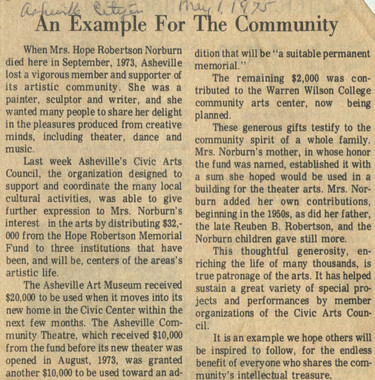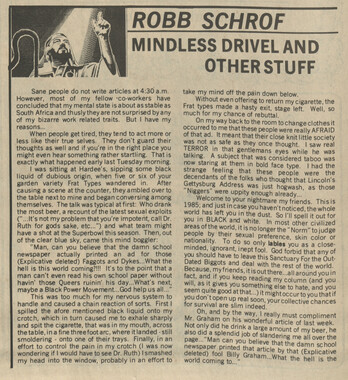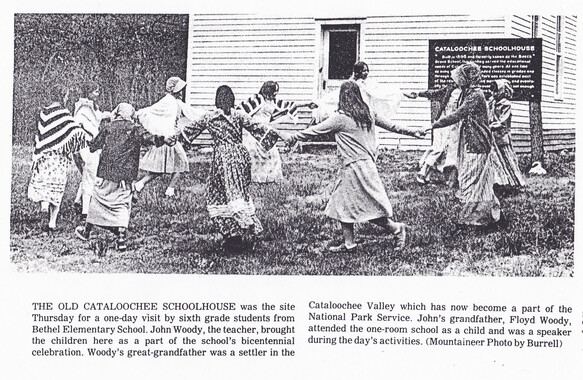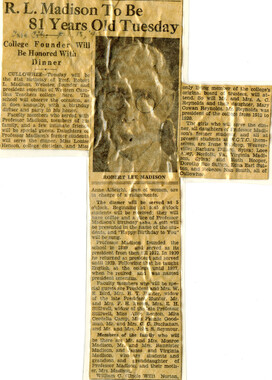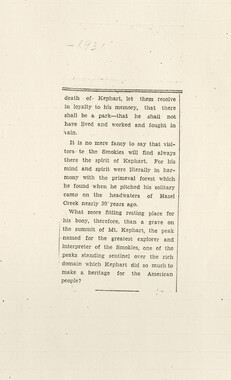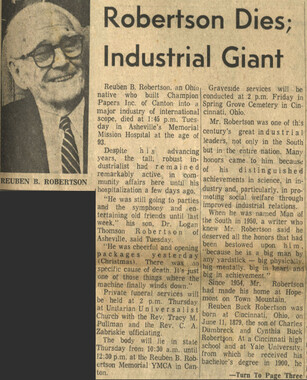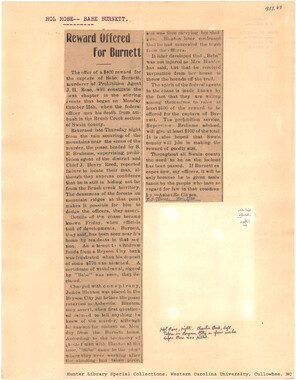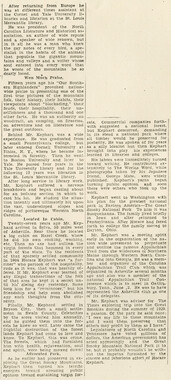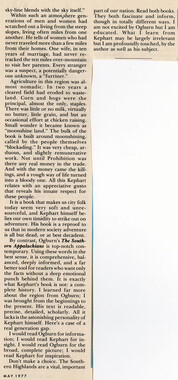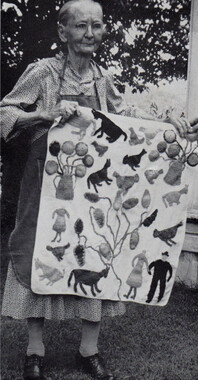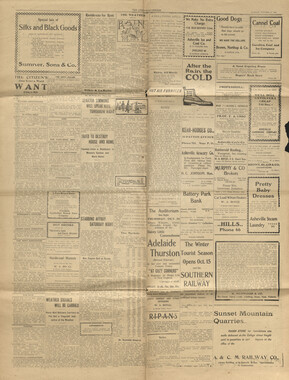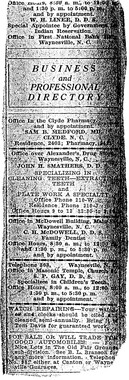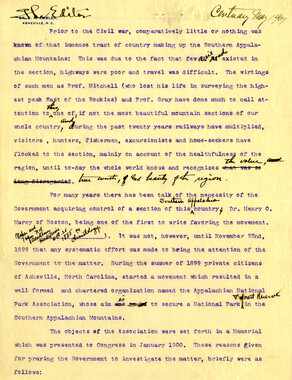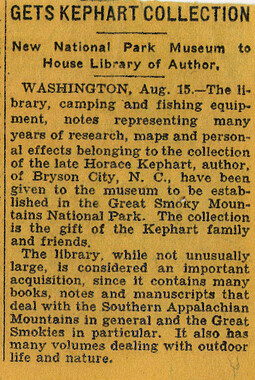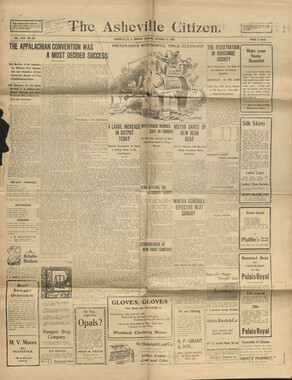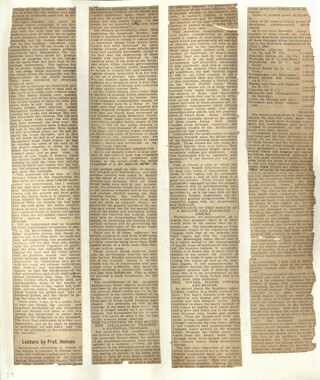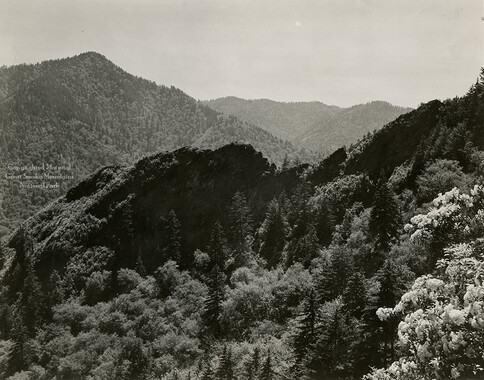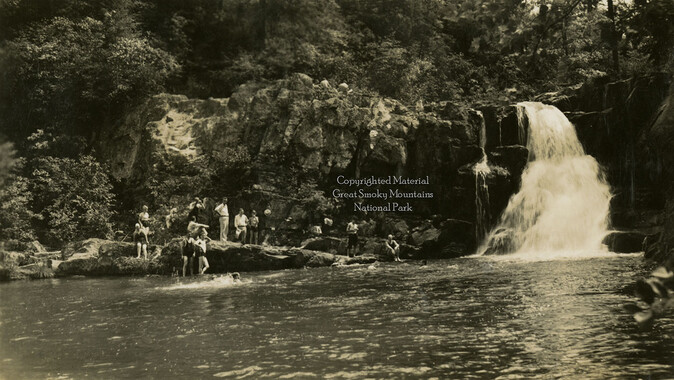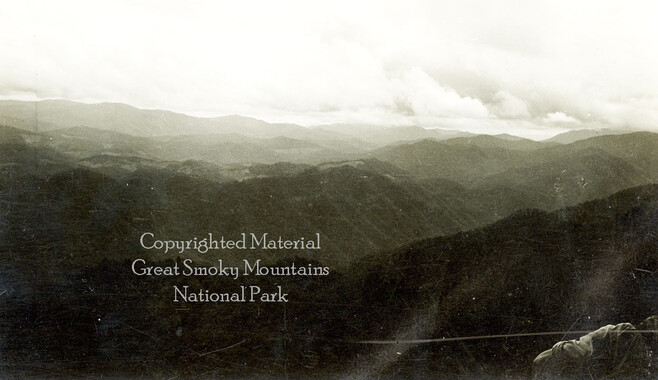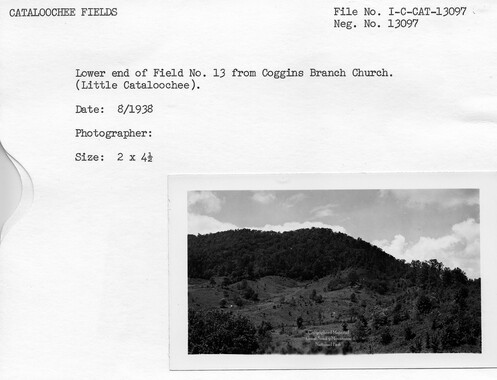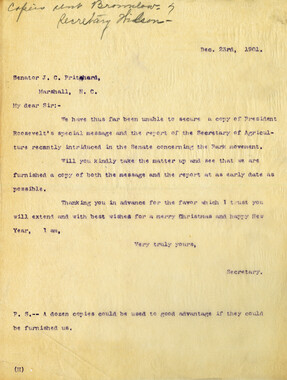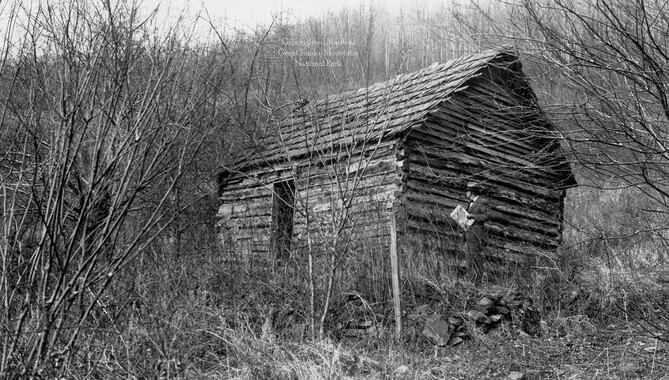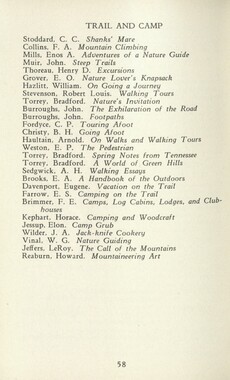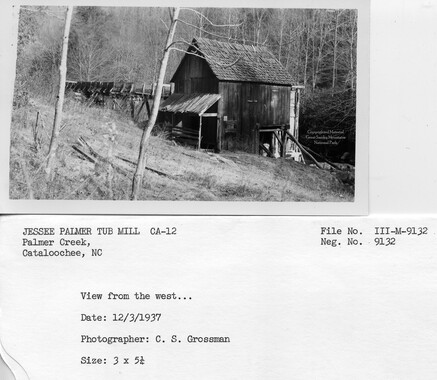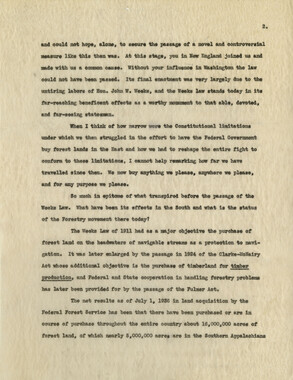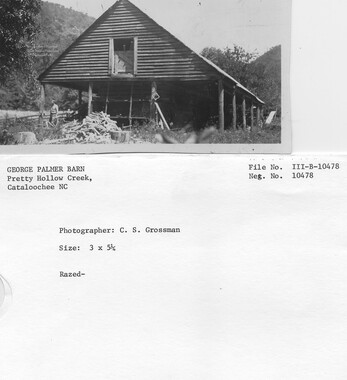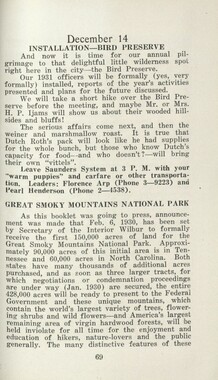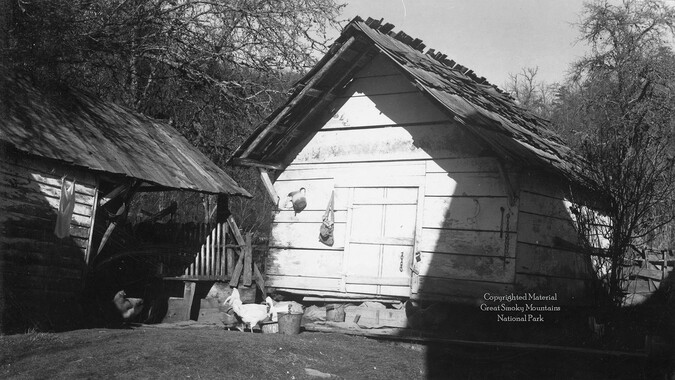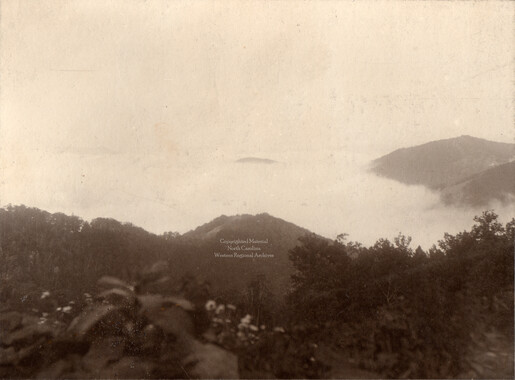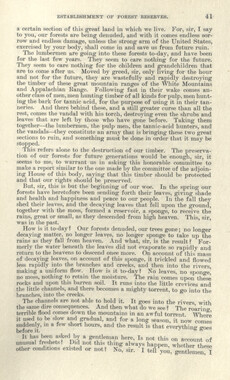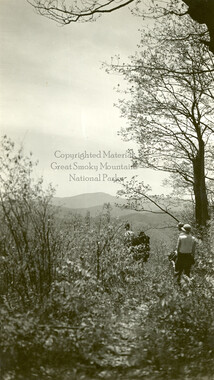Western Carolina University (20)
View all
- Canton Champion Fibre Company (2308)
- Cherokee Traditions (293)
- Civil War in Southern Appalachia (165)
- Craft Revival (1942)
- Great Smoky Mountains - A Park for America (2683)
- Highlights from Western Carolina University (430)
- Horace Kephart (941)
- Journeys Through Jackson (154)
- LGBTQIA+ Archive of Jackson County (15)
- Oral Histories of Western North Carolina (314)
- Picturing Appalachia (6679)
- Stories of Mountain Folk (413)
- Travel Western North Carolina (160)
- Western Carolina University Fine Art Museum Vitreograph Collection (129)
- Western Carolina University Herbarium (92)
- Western Carolina University: Making Memories (708)
- Western Carolina University Publications (2283)
- Western Carolina University Restricted Electronic Theses and Dissertations (146)
- Western North Carolina Regional Maps (71)
- World War II in Southern Appalachia (131)
University of North Carolina Asheville (6)
View all
- Appalachian National Park Association (53)
- Berry, Walter (76)
- Champion Fibre Company (5)
- Fromer, Irving Rhodes, 1913-1994 (70)
- Grant, George Alexander, 1891-1964 (96)
- Kephart, Horace, 1862-1931 (23)
- Masa, George, 1881-1933 (17)
- North Carolina Park Commission (105)
- Roth, Albert, 1890-1974 (142)
- Schenck, Carl Alwin, 1868-1955 (1)
- Stearns, I. K. (2)
- Thompson, James Edward, 1880-1976 (45)
- Weaver, Zebulon, 1872-1948 (55)
- Wilburn, Hiram Coleman, 1880-1967 (72)
- Allanstand Cottage Industries (0)
- Bennett, Kelly, 1890-1974 (0)
- Brasstown Carvers (0)
- Cain, Doreyl Ammons (0)
- Carver, George Washington, 1864?-1943 (0)
- Cathey, Joseph, 1803-1874 (0)
- Champion Paper and Fibre Company (0)
- Cherokee Indian Fair Association (0)
- Cherokee Language Program (0)
- Crittenden, Lorraine (0)
- Crowe, Amanda (0)
- Edmonston, Thomas Benton, 1842-1907 (0)
- Ensley, A. L. (Abraham Lincoln), 1865-1948 (0)
- George Butz (BFS 1907) (0)
- Goodrich, Frances Louisa (0)
- Heard, Marian Gladys (0)
- Kephart, Calvin, 1883-1969 (0)
- Kephart, Laura, 1862-1954 (0)
- Laney, Gideon Thomas, 1889-1976 (0)
- McElhinney, William Julian, 1896-1953 (0)
- Niggli, Josephina, 1910-1983 (0)
- Osborne, Kezia Stradley (0)
- Owens, Samuel Robert, 1918-1995 (0)
- Penland Weavers and Potters (0)
- Rhodes, Judy (0)
- Roberts, Vivienne (0)
- Sherrill's Photography Studio (0)
- Smith, Edward Clark (0)
- Southern Highland Handicraft Guild (0)
- Southern Highlanders, Inc. (0)
- Stalcup, Jesse Bryson (0)
- United States. Indian Arts and Crafts Board (0)
- USFS (0)
- Vance, Zebulon Baird, 1830-1894 (0)
- Western Carolina College (0)
- Western Carolina Teachers College (0)
- Western Carolina University (0)
- Western Carolina University. Mountain Heritage Center (0)
- Whitman, Walt, 1819-1892 (0)
- Williams, Isadora (0)
- 1810s (1)
- 1840s (1)
- 1850s (2)
- 1860s (3)
- 1870s (4)
- 1880s (7)
- 1890s (64)
- 1900s (294)
- 1910s (227)
- 1920s (461)
- 1930s (1501)
- 1940s (82)
- 1950s (15)
- 1960s (13)
- 1970s (47)
- 1980s (14)
- 1990s (17)
- 2000s (31)
- 2010s (1)
- 1600s (0)
- 1700s (0)
- 1800s (0)
- 1820s (0)
- 1830s (0)
- 2020s (0)
- Appalachian Region, Southern (80)
- Asheville (N.C.) (1)
- Avery County (N.C.) (6)
- Blount County (Tenn.) (145)
- Buncombe County (N.C.) (204)
- Cherokee County (N.C.) (10)
- Clay County (N.C.) (3)
- Graham County (N.C.) (108)
- Great Smoky Mountains National Park (N.C. and Tenn.) (416)
- Haywood County (N.C.) (263)
- Henderson County (N.C.) (13)
- Jackson County (N.C.) (58)
- Knox County (Tenn.) (17)
- Knoxville (Tenn.) (8)
- Lake Santeetlah (N.C.) (10)
- Macon County (N.C.) (25)
- Madison County (N.C.) (14)
- McDowell County (N.C.) (5)
- Mitchell County (N.C.) (7)
- Polk County (N.C.) (2)
- Qualla Boundary (22)
- Rutherford County (N.C.) (16)
- Swain County (N.C.) (513)
- Transylvania County (N.C.) (36)
- Watauga County (N.C.) (2)
- Waynesville (N.C.) (2)
- Yancey County (N.C.) (34)
- Aerial Views (3)
- Articles (1)
- Artifacts (object Genre) (4)
- Clippings (information Artifacts) (77)
- Drawings (visual Works) (174)
- Envelopes (2)
- Financial Records (9)
- Fliers (printed Matter) (34)
- Guidebooks (1)
- Interviews (11)
- Land Surveys (102)
- Letters (correspondence) (219)
- Manuscripts (documents) (91)
- Maps (documents) (69)
- Memorandums (14)
- Minutes (administrative Records) (20)
- Negatives (photographs) (198)
- Newsletters (12)
- Paintings (visual Works) (1)
- Pen And Ink Drawings (1)
- Photographs (1657)
- Portraits (36)
- Postcards (15)
- Publications (documents) (107)
- Scrapbooks (3)
- Sound Recordings (7)
- Speeches (documents) (11)
- Transcripts (46)
- Aerial Photographs (0)
- Albums (books) (0)
- Biography (general Genre) (0)
- Cards (information Artifacts) (0)
- Crafts (art Genres) (0)
- Depictions (visual Works) (0)
- Design Drawings (0)
- Facsimiles (reproductions) (0)
- Fiction (general Genre) (0)
- Glass Plate Negatives (0)
- Internegatives (0)
- Newspapers (0)
- Occupation Currency (0)
- Periodicals (0)
- Personal Narratives (0)
- Plans (maps) (0)
- Poetry (0)
- Programs (documents) (0)
- Questionnaires (0)
- Sheet Music (0)
- Slides (photographs) (0)
- Specimens (0)
- Text Messages (0)
- Tintypes (photographs) (0)
- Video Recordings (physical Artifacts) (0)
- Vitreographs (0)
- Appalachian National Park Association Records (336)
- Carlos C. Campbell Collection (198)
- Cataloochee History Project (65)
- George Masa Collection (89)
- Hiram C. Wilburn Papers (28)
- Historic Photographs Collection (236)
- Horace Kephart Collection (126)
- Humbard Collection (33)
- Jim Thompson Collection (44)
- Love Family Papers (11)
- Map Collection (12)
- R.A. Romanes Collection (10)
- Smoky Mountains Hiking Club Collection (616)
- Zebulon Weaver Collection (107)
- A.L. Ensley Collection (0)
- Appalachian Industrial School Records (0)
- Axley-Meroney Collection (0)
- Bayard Wootten Photograph Collection (0)
- Bethel Rural Community Organization Collection (0)
- Blumer Collection (0)
- C.W. Slagle Collection (0)
- Canton Area Historical Museum (0)
- Cherokee Studies Collection (0)
- Daisy Dame Photograph Album (0)
- Daniel Boone VI Collection (0)
- Doris Ulmann Photograph Collection (0)
- Elizabeth H. Lasley Collection (0)
- Elizabeth Woolworth Szold Fleharty Collection (0)
- Frank Fry Collection (0)
- Gideon Laney Collection (0)
- Hazel Scarborough Collection (0)
- Hunter and Weaver Families Collection (0)
- I. D. Blumenthal Collection (0)
- Isadora Williams Collection (0)
- Jesse Bryson Stalcup Collection (0)
- John B. Battle Collection (0)
- John C. Campbell Folk School Records (0)
- John Parris Collection (0)
- Judaculla Rock project (0)
- Kelly Bennett Collection (0)
- Major Wiley Parris Civil War Letters (0)
- McFee-Misemer Civil War Letters (0)
- Mountain Heritage Center Collection (0)
- Norburn - Robertson - Thomson Families Collection (0)
- Pauline Hood Collection (0)
- Pre-Guild Collection (0)
- Qualla Arts and Crafts Mutual Collection (0)
- Rosser H. Taylor Collection (0)
- Samuel Robert Owens Collection (0)
- Sara Madison Collection (0)
- Sherrill Studio Photo Collection (0)
- Stories of Mountain Folk - Radio Programs (0)
- The Reporter, Western Carolina University (0)
- Venoy and Elizabeth Reed Collection (0)
- WCU Gender and Sexuality Oral History Project (0)
- WCU Mountain Heritage Center Oral Histories (0)
- WCU Oral History Collection - Mountain People, Mountain Lives (0)
- WCU Students Newspapers Collection (0)
- Western North Carolina Tomorrow Black Oral History Project (0)
- William Williams Stringfield Collection (0)
- Appalachian Trail (19)
- Church buildings (9)
- Civilian Conservation Corps (U.S.) (91)
- Dams (20)
- Floods (1)
- Forest conservation (11)
- Forests and forestry (42)
- Great Smoky Mountains National Park (N.C. and Tenn.) (64)
- Hunting (2)
- Logging (25)
- Maps (74)
- North Carolina -- Maps (5)
- Postcards (15)
- Railroad trains (8)
- Sports (4)
- Storytelling (2)
- Waterfalls -- Great Smoky Mountains (N.C. and Tenn.) (39)
- African Americans (0)
- Artisans (0)
- Cherokee art (0)
- Cherokee artists -- North Carolina (0)
- Cherokee language (0)
- Cherokee pottery (0)
- Cherokee women (0)
- College student newspapers and periodicals (0)
- Dance (0)
- Education (0)
- Folk music (0)
- Forced removal, 1813-1903 (0)
- Gender nonconformity (0)
- Landscape photography (0)
- Mines and mineral resources (0)
- Paper industry (0)
- Pottery (0)
- Rural electrification -- North Carolina, Western (0)
- School integration -- Southern States (0)
- Segregation -- North Carolina, Western (0)
- Slavery (0)
- Weaving -- Appalachian Region, Southern (0)
- Wood-carving -- Appalachian Region, Southern (0)
- World War, 1939-1945 (0)
- Sound (7)
- StillImage (2088)
- Text (655)
- MovingImage (0)
Editorials: News & Courier
Item
Item’s are ‘child’ level descriptions to ‘parent’ objects, (e.g. one page of a whole book).
-
-
WISE MIX OF THE MOUNTAIN I»' ** men, who are still living to-day, aessed the end of the gradual trans- TT22S_Ji formation from brake and prarie into K^ **"*] parvenu forests that pose as patriarchs. - V Can Mr Cathey refute or confirm my •mm Chuckey Joe Insists that Ottaray is as Superior to Ottalay as Is Carolina to "Callltaa"—He Asks Some Leading Questions of Mr Traylor, of Virginia, and Mr Cathey, of North Carolina, and Makes Sundry Amusing Observations on the Home-made "Lakes of the Sapphire Country." TtjUC/J/fil t%*ff. To the Editor of The Xews and Courier: I have read with much interest the letter of your Virginia correspondent, Mr R. L. Traylor, and also Mr Jas H. Carney's communication to the Asheville Citizen, which appears in your tri-weekly issue of the 9th. Mr Cathey, or. rather, his informant, (whose name he fails to give us.) very dis-. tinctly supports the statement made by me in my lirst communication to you, viz, that "Ottalay" and "Ottaray" were both legitimate; the first pronunciation in vogue among the Over-Hillers, or Indians of Crackerdom, and the second the accepted fortn among the much mbre widely distributed and more numerous clans of the Under Hills. The choice between the two forms, therefore, is simply one of taste. I certainly prefer the rotund roll of the "r" in "Ottaray" to the somewhat leaner, lisping lapse of the "1" in "Ottalay." For the same reason, perhaps, I prefer the "Carolina" of the lowlanders to the "Cal- lina," 'Which really more exactly represents the sound of the word—in general use—in what was once the fam of Buncombe." But, more than this, my effort has been to revive the word most generally applied to this region in colonial days, not only by Indians, but by the whites. 'And I think an examination of the most authentic records will show that the usual, almost universal, form was not Ottalay, but Ottaray. That is the term used by Adair, by Lawson and by Bartram, three of the best of our colonial chroniclers, as far as my limited knowledge extends. The Cherokees in Tennessee (says Godspeed) always used the "r" instead of the "1." I cannot accept as of equal authority the dictum of an unknown Cherokee—from Cherokee—and further, it Is a well-known fact that the Indians on Snow Bird, in Graham County, speak a dialect that varies considerably from that used on Luf- tee and Soco; not merely a difference of pronunciation, but sometimes the same thing represented by a different word; for instance, a "bat" in Cherokee County was called "Klammehaw," but in Swain County "Tzawwayha." In assuming that the term Ottaray might possibly be derived from the lakes of the Sapphire country, Mr Traylor may have been misled by An article in your issue of August 10, in which a writer, whose fancy certainly out-balanced his farts, (perhaps the very poet who is to profit by our regenerated nomenclature,) in speaking of Western North Carolina exclaims: "But how few know, or eve/i guess, (etc,) that magnificent lakes (etc) abound on every side." No one regrets more than I do that these "magnificent lakes" are all either legendary or Pre-Silurian; but possibly ti-e writer was indulging in a little dry humor, at the expense of our two little lakelets, near Sapphire, both artificial, and the largest, if I remember rightly, not three miles long but with a shore line of about that length. Small as they are they are said to be charming, and I only hope others may follow the example of this enterprising syndicate or land company. With an expenditure of from $10,000 to $50,000 per pond we might have a score of picturesque lakelets, nay fifty of them from the birken bowers of the Cohuttas to the "balsams" of Kaunayrock, varying, it length from two to four mil. ~s»«M*w^.ii,ii,' ■tt»l ift'K "aiui 9\v 'iMum,—' statements? Has V' Cathey ever heard of the mystic, or m>!rLerious, Indian city of "Shainrack" or "Shainrach," situated in a region rich in quarries of marble and mines of silver? Has Mr Cathey ever heard of the famous Herbert's Spring, (perhaps it was Saint Hubert's—patron of hunters:) its waters, one of the fountain-heads of the Savannah (Isuhdayga) or perhaps of the "Tenniseeta," (Little Tennessee?) Even in the more remote colonial days it was held that he who drank of these witching waters forgot family and home and was doomed (or delighted) to remain wandering among the Over Hills of Ottaray for full seven years. To-day, in Crackerdom, our legends haven't a leg left to stand on. Like the Cherokees, we have grown ashamed of our fables, even though we often fail to stick to—facts, /a^f/^^ /fft —- Chuckey Joe. 'Cloverpatch, N. C.f September 11, 1899. THE TEACHERS OF FAIKF1EZD, State Superintendent McMahan and his Assistant, Mr McGhee, Visit the Summer School and are Highly Pleased with the Management and Attendance—A Poor Cotton Crop this Year—Personal. Winnsboro, September 12.—Special: Mr J. G. McCants, a prominent lawyer of the local Bar, lectured to the teachers of the summer school at the Court House on Friday evening. He made a vigorous plea for.the tiiuiuuati training of teachers, and paid very high tribute to Dr Grier as one of the leading educators of his day. There was a larg ice, and was heard with cios attention. A few nights ago, when Habenicht was o; books were remo' perintendent's* oj fear that Your corn books, whi(| county, hnv common If they haj would havj were damaj invests protect them. If Fairfl milling pi report th<| low standing | price is ing here I prices ai farmers f targe w:| Mr \V| tendent school and expl| teaching interest!! last eve| tion. State McMaha pressed j work tl) his The. mmrmnmm tu.uu w thus far our only plutocrat seems to pi fer palaces to ponds. A\ ithin five or six miles of Hendersoi ville, on the upper ♦waters of Mud Creek? (Oss-quee-ha-ha,) within sight of th< ;s of Kohlassa, lies a picturesque val ley. which could readily be convert- comparatively .small cost, into a iake of two, or pebaps over three, miles in length; but our millionaires (if we had any) would doubtless turn up their noble s at investing in that sort of "watered stock." So much for the "Legend of the Lakes." Doubtless there were dozens of them re? fleeting the snow-capped summits of the Appallachlains of Silurian days: as geologists tell us chat when tit 'v but babies, and the Himalayahs yet unborn, our Over Hills towered at least 20,0' higher than they now do. But that goes back further than even I can remember. The meaning of "Nantahaylih," as given bv Mr Cathey's informant, may be the correct one, but Chief Smith held it owed its name to the fact that the Indian runners, between Valley River (Kouna- ■h)) and the settlements on Luftee and Soco, crossed its waters usually about, noon; hence the Noon-tide River. Nor can I agree with the gentleman from Cherokee that the Indian vernacular "breathes the very sermon and song of life." The two words he cites, viz: "Xantahalah" and "Swannanoah," in the aboriginal would he pronounced quite differently from any sounds represented by our spelling, or that could be so represented. Let any one utter a sentence in English of say fifteen or twenty words without the use of labials, that is never bringing the lips together, and he will get a faint idea of what the unadulterated, nn-de-sieele Cherokee really is. But, carefully corrupted, that is, with judicious selections and rejections, it is (together with Tuscarora and Catawba) the best and, perhaps, the only vocabulary adapted to the purpose we have in view; viz: ti regeneration of our mountain names, an with the exercise of a, little taste and a tear attuned to nature's harmonies we ma escape the abominations of the Hiawath legend, and yet establish a native atr noble nomenclature. Can your Virginia correspondent tell whence came the Cherokees? By thi own showing they were not Autochthone'^! but invaders, and had exterminated th last of the "Steekeh Unakas" (Little Whites—a dwarf race—which, if not white, less dark in color than themselves,) not long before the first advent of the European hunter and trapper into their fast- They told Bartram. in 1776, that they had never built the so-called "Indian mounds," and knew nothing of the mound builders. The same information was given to me by Chief Smith—over a hundred years later. Nor did these Cherokees ever manufacture the flint and stone (sometimes even of obsidian, which is not one of our native rocks,) arrow heads, still so abundant in some parts of this region. t'apt C. R. Boyd, of Wytheville, Virginia, told me some ten years ago that the last buffalo was killed in Southwest Virginia in 1792. In 1750 they were still not rare in present Laurens district of South Carolina. Some years after the rebellion of 1776 Joe Dobson, a famous hunter in his day. hunted elk on the mountains that wall in so grandly the famous Linville Gorge. Can Mr Cathey tell us when the last elk was killed in Western North Carolina and when the last herd of buffalo driven wards by their relentless pursuers? It is generally assumed that this part of the continent, when first discovered, was covered by primeval forests, yet the colonial records show that not only were the woodlands much more open then than now, hut extensive canebrakes and wide prairies existed where now the thrifty trees stand thick and tall. In other words, the "forest primeval,' at least in this region, is a myth, and the grandfathers A f asm ■ Geo Mat mingsl be an| girls I j Mis; this! SheJ fev I kef I ■ Thl desf lun thit Th<J an [ strl thd cad del I I I I f I I : tl;
Object
Object’s are ‘parent’ level descriptions to ‘children’ items, (e.g. a book with pages).
-
In promoting a national park in the southern Appalachians, the association submitted dozens of editorials to newspapers and magazines throughout the east coast. After the editorials were published, the Appalachian National Park Association often reprinted and circulated them as part of their promotional campaign. This series of editorials was printed in the Charleston News and Courier and were written by A. M. Huger who wrote under the pseudonym “Chucky Joe.”
-








